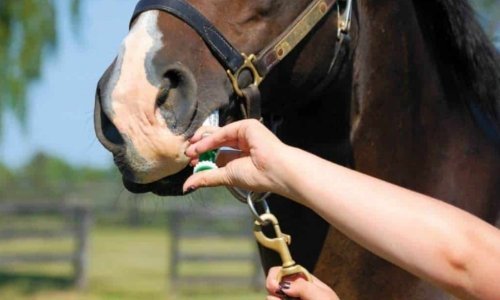As a horse owner, it is your responsibility to protect your horse from common parasites such as bots, lice, worms and ticks. Worm infestations can have severe effects on horses including weight loss, diarrhoea, constipation, colic and even death. While worming can sometimes be a tricky task, it is vital to keep your horse happy and healthy. Here's everything you need to know about worming your horse.
Faecal egg count (FEC)
It is essential to ensure you are giving your horse an accurate dose of worming based on their weight. A faecal egg count is a cheap and simple test to determine your horse’s level of infection. By doing regular faecal egg counts, you are able to identify the worms that are most likely to cause problems for your horse and come up with a specific worming strategy. Regular FEC’s can also help reduce the amount of unnecessary worming treatments your horse receives. Some adult horses are more susceptible to parasites than others, meaning they have a higher number of eggs in their faeces. These horses may need to be wormed more regularly to keep worms under control.
Common parasites in horses
- Large Strongyles (Strongylus vulgaris)
- Small Strongyles (Cyathostomes)
- Large Roundworms
- Tapeworms
- Pinworms
- Bots
How often should I worm my horse?
When considering a worming schedule for your horse, it is important to note that there is no one size fits all. The frequency, timing and type of wormer will depend on a range of factors, including location, number of horses, age and individual susceptibility to parasites. Tailored horse worming programs ensure specific worms are targeted with an effective product at the right time.
While we always recommend consulting with your vet, a general recommendation is to worm your horse regularly with an effective, broad spectrum wormer to prevent any build up of worms in the stomach or intestines. Most worming paste requires dosage every 8-16 weeks, but always follow instructions on the label. Where there are a large number of horses kept close together, there will be a greater need for worm control as horses are at greatest risk of contamination. Horses on studs or agistment properties should all be wormed at the same time, using the same product. In addition, be sure to worm all new horses that arrive on the property and keep them separated for at least 48 hours.
Foals and Pregnant Mares
Special care should be taken to ensure that pregnant mares and foals are wormed regularly with the correct product. You should always ensure that you use a wormer that is effective against roundworm when worming a horse under two years of age. Pregnant mares should be wormed prior to foaling with a wormer that is safe for use in pregnancy. Foals need to be wormed from 6 weeks of age, and may need to be wormed more regularly than an adult horse. You should always consult with your veterinarian before coming up with a worming schedule for your pregnant mare and foal. Equimax Elevation is a broad-spectrum wormer that is safe to use on all horses including foals and pregnant mares.
Worm Resistance
Overuse of worming drugs has led to the evolution of worm species that are resistant to many of the commonly used worming pastes. Resistance results in decreased effectiveness of worming treatments, as the worm is tolerant to the killing effects of the wormer. There are various strategies that can be used to effectively control worms while minimising the risk of resistance.
Rotational worming
Rotational worming is a simple strategy to implement to reduce the effects of worm resistance. Rotational worming involves simply rotating between two different classes of worming drugs to make sure your horse is treated against all the necessary worms, while reducing the risk that resistance will develop to a particular class of drug. It is recommended to rotate between a Benzimidazole wormer such as Ammo, Equinox Orange or Strategy T and a Macrocyclic Lactone wormer such as Equimax, Equest or Expel Yellow. Always ensure you use the correct dose and that the horse receives the whole dose by placing the paste as far back on the tongue as possible.
Other management strategies
As well as rotational worming, there are various other strategies that will help to reduce the number of larvae in your pasture, reduce transmission and resistance in parasites. We have listed some of the most effective strategies below:
-
Remove faeces from the paddock regularly
- Effective pasture management
- Avoid feeding your horse hay or hard feed off the ground
- Spell the paddocks during hot, dry conditions
- Alternate grazing of paddocks with another species such as cattle or sheep
- Separate horsing according to age
- Worm all horses on the property at the same time
- Worm all new horses before they enter the property
Worms that affect horses are everywhere, and horses of all ages are exposed to worms in their environment. Worm prevention is one of the most important aspects of horse ownership. A regular deworming program using faecal egg count is the most sustainable way to manage the worming of adult horses. This will ensure your horse is wormed at the correct intervals, and help prevent them becoming resistant to specific worming pastes. We highly recommend consulting your vet to build a strategic worming program suitable for your horse.






